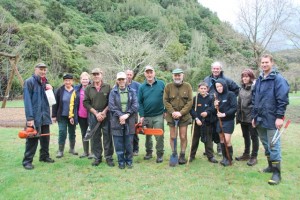The Project Manu group is based in Te Kuiti and has been working in the Mangaokewa Scenic Reserve (200 hectares) since 1995.
Project Manu aims to protect and improve the biodiversity of the reserve. They were inspired by the diversity and numbers of birds and flora at the Mapara Kokako reserve and hoped to emulate this effect on the local flora and fauna! The group have grown to 50 volunteers with a stable core and regular new members.

The reserve is a lowland podocarp/tawa forest with nikau groves lower down the hill slopes beside the Mangaokewa river.
The Reserve offers great walking, camping in the picnic area, swimming, fishing, rock climbing, interesting geology (there are several places where you can see limestone with fossils, on top of underlying greywacke) and a wonderful variety of flora.
The reserve is home to tui, bellbird, kererū, tomtits, robin, fantails and the occasional kaka. These birds spill over into the local township where it is now not unusual to see 15 tui in one cherry tree. The group attribute this to their having a safe breeding haven in the reserve.
The group translocated robins from Pureora in 2000. They trained and captured 60 and now have a stable population with good fledging rates. However the population does not appear to be increasing.They hold three-four working bees throughout the year. Over the years members of the group have taken their young children in backpacks to working bees so the children learnt about conservation from an early age.
After each working bee the group has a BBQ lunch together in the reserve. The friendships made through the groups work have endured over a number of years. Project Manu also carry out weed management in the reserve and along the tracks. One of the tracks in the reserve is now part of the Te Awaroa Trail.

